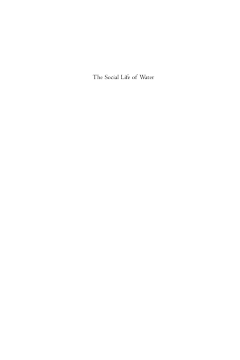
Additional Information
Book Details
Abstract
Everywhere in the world communities and nations organize themselves in relation to water. We divert water from rivers, lakes, and aquifers to our homes, workplaces, irrigation canals, and hydro-generating stations. We use it for bathing, swimming, recreation, and it functions as a symbol of purity in ritual performances. In order to facilitate and manage our relationship with water, we develop institutions, technologies, and cultural practices entirely devoted to its appropriation and distribution, and through these institutions we construct relations of class, gender, ethnicity, and nationality. Relying on first-hand ethnographic research, the contributors to this volume examine the social life of water in diverse settings and explore the impacts of commodification, urbanization, and technology on the availability and quality of water supplies. Each case study speaks to a local set of issues, but the overall perspective is global, with representation from all continents.
“The Social Life of Water successfully addresses a wide range of issues concerning the meanings and uses of water in relation to culture, society, and development. As a volume, it shows how a focus on social life opens up new analytical possibilities of broader relevance to the study of water. Moreover, many of the chapters explore contexts and regions not previously covered in work on these topics.” · Journal of Royal Anthropological Institute
“…this volume [is to be] recommended to readers interested in the anthropology of water and to those who wish to teach a course on the subject for both undergraduate and graduate students. The diversity of the topics covered in the book and the methodological and theoretical issues raised, provide several excellent teachable moments not to be missed. It also testifies to the richness of topics and ways in which the social lives of water can and should be explored by anthropologists in the future.” · Anthropological Notebooks
“For anthropologists working in the water field, the book provides useful material to help the water field incorporate good social practice, research and theory into a transdisciplinary field currently interested in incorporating it into policy and management.” · Water Alternatives
“This book fills an important niche on water related issues in anthropology by focusing on social and cultural manifestations of water management, use, and conflict… The organization is appropriate and effective.” · Benedict J. Colombi, American Indian Studies Program, University of Arizona
John R. Wagner is an Associate Professor of Anthropology at the University of British Columbia, Okanagan. He conducts research in Canada, the United States and Papua New Guinea and has published several journal articles on water governance in the Okanagan Valley. In 2007 he was lead guest editor of Customs, Commons, Property and Ecology, a special edition of Human Organization devoted to an analysis of Pacific Island customary property rights systems. Recent publications include “Water and the Commons Imaginary” in the Public Anthropology Forum of Current Anthropology (2012).
